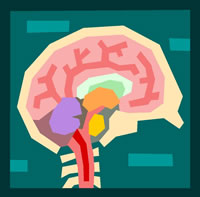The production of hormones is done by many glands throughout our body, and together they are part of the endocrine system.
When you have a thyroid disorder or disease, these conditions originate in the endocrine system and cause a hormone imbalance. When you have a hormone imbalance, the amount of hormone produced by a specific endocrine gland is either too little, or too much of one or many hormones.
Several types of hormones are produced inside the cranium, and as would be expected, several of these hormones act as controllers for other endocrine glands outside of the head. For example, when we talk about the thyroid and diseases related to thyroid, the standard and advanced tests assess the hormones TPO, TSH, T3, T4. These are called the thyroid hormones, even though TSH, thyroid-stimulating hormone (TSH), is produced by the pituitary in the cranium, and not by the thyroid. TSH is a "master hormone" produced by the pituitary to control the thyroid gland's production of thyroxine (T4) and triiodothyronine (T3). But even the production of TSH in the pituitary is controlled by another master hormone, called TRH (thyrotropin-releasing hormone) secreted by the Hypothalamus gland. It produces TRH (thyrotropin-releasing hormone) which can inhibit the release of TSH (thyroid-stimulating hormone) from the pituitary. And without TSH,
One aspect of hormones that we all recognize from our own experience, is the profound effect hormones have on our moods, desires, ambition, cravings, addictions. In fact, the growing body of research suggests that hormones play a major role in the experience we have of our life. An imbalance in hormones can have a startling effect on our quality of life.
Hormones are produced by the least likely places in our bodies. Our attitudes may change on how we feel about fat and bodies, when we discover that the andipose tissue, where fat is produced and stored, is highly hormonally active. Our fat producing tissues, in addition to cushioning and insulating the body, serve as major endocrine organ producing hormones like leptin, estrogen, resistin, and the cytokine TNFα. And guess what? The leptin hormone is key to decreasing our appetite and increase our metabolism (our desire to exercise originates here). While many of us are cutting and sucking our fat out of our bodies through plastic and cosmetic surgery, there may be evidence one day to suggest that cutting a major endocrine gland out of our bodies, the one that specifically decreases our appetite, creates more problems. Being overweight is consistently a sign of a hormonal imbalance.
| Oxytocin (OXT) hormone produced by the pituitary, affects the release of breast milk, has significant influence on a woman having an orgasm, allows us to develop a sense of trust between people, and provides circadian homeostatsis effecting body temperature, activity level, wakefulness | ||
| Hypothalamus gland produces Dopamine, which effects heart rate, blood pressure, and prolactin, and by TRH (thyrotropin-releasing hormone) can inhibit release of TSH (thyroid-stimulating hormone) from the pituitary. |
Pineal gland |
|
| Somatostatin (SRIF) by hypothalamus |  |
Prolactin (PRL) of pituitary is how we get feelings of sexual gratification, and stimulates the production of milk in mammary glands. |
| Angiotensinogen (ACTH) | Central Nervous System (CNS) produces Serotonin, which controls mood, appetite, and sleep | |
| Prolactin releasing hormone (PRH) in the hypothalamus modulates the release of prolactin from the pituitary | Luteinizing hormone (LH) from the pituitary stimulates the gonads and subsequently, ovulation, and for men, production of testosterone. | Orexin hormone produced by the hypothalamus influences our wakefulness and increased energy expenditure, and influences our appetite. |

